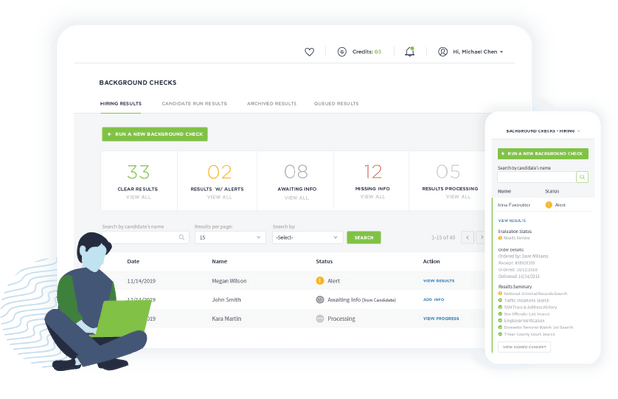How to Run Employment Background Checks: A Complete 5-Step Guide
Learn how to run a background check for employment to make informed, fair, and compliant hiring decisions
Click a chapter to scroll directly to it.
In today’s competitive job market, employers want to hire the most qualified candidates for the job. To ensure eligibility and make informed hiring decisions, many employers conduct background checks to review information about a candidate’s criminal history, education and employment history, driving record, and more.

Idaho state background checks provide employers with a screening tool to evaluate potential hires. These checks may look into a candidate’s criminal history, driving record, or other relevant information to assess eligibility for specific roles. Employment screenings play a key role in ensuring the safety and integrity of organizations and are widely used across various industries.
Background checks are not limited to pre-employment screening; they are also commonly employed in volunteer positions, housing applications, and other instances where trust and responsibility are paramount. By conducting comprehensive background checks, employers and organizations can mitigate risks, make informed hiring decisions, and safeguard their reputation.
Employment background checks in Idaho enable employers to verify the accuracy of information provided by job candidates on their resume, application, and during interviews. By reviewing a candidate’s history, employers can make more informed hiring decisions. Additionally, some employers in Idaho may be required to complete pre-employment background checks to comply with industry regulations.
Information included in a Idaho state background check depends on the type of search conducted; federal, state, and local laws regulating background checks; and the employer’s background screening policy.
Here are some common background screenings that Idaho employers may conduct and what may be reported:
Employers can choose to perform background checks in Idaho themselves or work with a qualified CRA, like GoodHire. While it may be possible to conduct certain types of Idaho background checks online, many types of screenings require reports to be ordered by mail or in person which can be time-consuming for human resources teams.
To obtain fast, comprehensive background checks in Idaho, many employers partner with a qualified consumer reporting agency (CRA), like GoodHire. GoodHire offers a streamlined and efficient process, while supporting compliance with applicable federal, state, and local regulations.

Background checks in Idaho can take a few minutes to several weeks to complete, depending on who is performing the search, the types of records requested, and the scope of the check. The turnaround time primarily depends on various factors:
1. Scope: Comprehensive background checks that involve multiple screenings, such as criminal records, education and employment verification, and driving records, naturally take longer.
2. Data availability: The speed of a background check also depends on the accessibility and response rates of the sources, including courthouses, schools, former employers, and credit bureaus. If any of these entities have backlogs or delays in providing information, it can prolong the screening process.
3. Third-party service providers: If an employer chooses to utilize a third-party CRA like GoodHire, the timeline may depend on the efficiency and capacity of the chosen service. These background check companies usually have streamlined processes and a network of data sources, which can expedite the process.
4. Candidate communication: The promptness of a background check also depends on the cooperation and availability of the job candidate. Timely responses to requests for information, authorizations, and verifications from the candidate can significantly reduce the overall timeline.
When employers conduct employment background checks themselves, it can be time-consuming. Often hiring managers need to manually request information about a candidate from different public record sources, like court records and motor vehicle records. Other types of reports may require non-public record searches, like calling professional references or confirming past employers or schooling.
To speed the turnaround times and streamline the process, many employers choose to work with a background check provider, like GoodHire. Our advanced technology reduces manual processes to deliver faster and more accurate background checks so you can speed hiring and onboarding.
Employers in Idaho who partner with a CRA to perform background checks must adhere to the Fair Credit Reporting Act (FCRA). To maintain compliance with this federal law, employers must provide candidates with written disclosure of your intent to conduct a background check and obtain written consent from the candidate before proceeding. If a decision is made not to hire a candidate based on information obtained from a background screening report, you must also follow the adverse action process.
If employers have inquiries regarding Idaho background check laws, it is advisable to seek guidance from legal counsel to determine applicable laws.
Idaho background checks can help employers confirm a candidate’s qualifications and eligibility for a role and organization. Employers often choose to partner with a background check provider, like GoodHire, to streamline the screening process. GoodHire offers 100+ screening options with fast turnaround times and accurate, easy-to-read results. Plus, our compliance tools make it easier to manage potential liability. Get started.

The resources provided here are for educational purposes only and do not constitute legal advice. We advise you to consult your own counsel if you have legal questions related to your specific practices and compliance with applicable laws.
Learn how to run a background check for employment to make informed, fair, and compliant hiring decisions
A state criminal background check provides valuable insight into a candidate’s criminal history to enable employers to make better hiring decisions.
A “failed” a background check doesn’t necessarily mean you shouldn’t hire the candidate. Follow these five steps to make an informed decision.